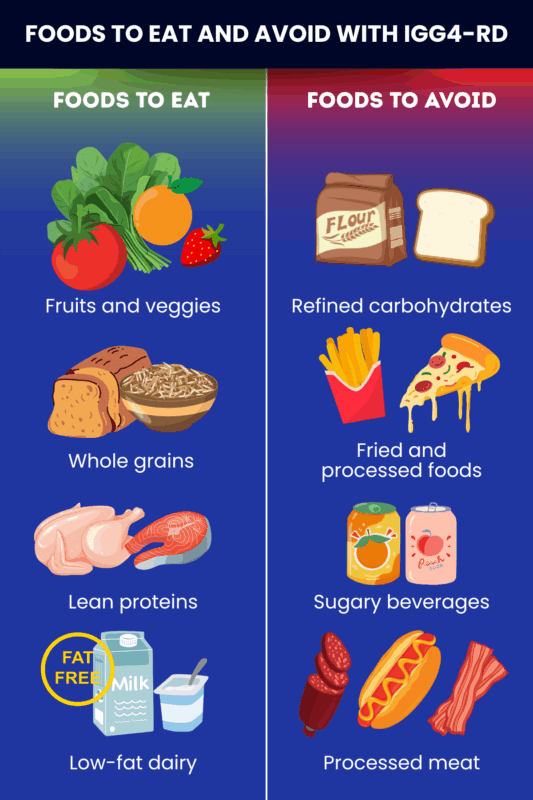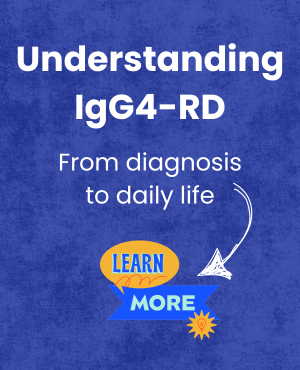IgG4-RD diet: Foods to eat and avoid
Last updated Sep. 1, 2025, by Lindsey Shapiro, PhD

While there is no one-size-fits-all diet for immunoglobulin G4-related disease (IgG4-RD), eating certain foods — and avoiding others — can play a supportive role in managing this rare immune-mediated condition.
By working with your IgG4-RD care team, you can incorporate an IgG4-RD diet into your management plan that can hopefully help you feel your best and support your overall health.
IgG4 is caused by the abnormal accumulation of immune cells in the body’s tissues, especially plasma cells that produce high amounts of IgG4 antibodies. Inflammation and scarring from this abnormal immune activity give rise to tumor-like masses that can damage and impair the function of virtually any organ.
How food can support your health with IgG4-RD
There’s no solid evidence that a particular diet will fundamentally alter the course of IgG4-RD, and managing IgG4-RD with food alone is not feasible. However, eating a healthy diet can play a supportive role in disease management.
While your specific nutrition needs will depend on several factors — including which organs are involved, what medications you’re using, and other health-related concerns — eating the right foods after your IgG4-RD diagnosis may help:
- reduce inflammation
- support organ and immune health
- ease medication side effects
- boost energy levels and overall health
Beyond helping to fight the effects of IgG4-RD itself, diet can help you manage the side effects of IgG4-RD treatments, particularly corticosteroids, a class of strong anti-inflammatory medications that can lead to side effects such as high blood sugar and weight gain.
Foods to eat
There is not enough evidence to say that eating more of any particular food will alter the course of IgG4-RD. But some foods may be able to help lower inflammation and ease IgG4-RD symptoms.
Knowing what to eat with IgG4-RD will depend on several factors.
In general, healthy meals for IgG4-RD look much like they do for everyone else and should involve a variety of nutritious foods, including:
- plenty of fruits and vegetables
- whole grains, like brown rice, quinoa, and oats
- lean meats and proteins, including fish, chicken, turkey, beans, and tofu
- low-fat dairy products, such as fat-free milk and yogurt
Anti-inflammatory foods
Chronic inflammation is a hallmark of IgG4-RD, and there is a link between diet and inflammation. So, eating a nutritious diet with plenty of anti-inflammatory and immune-supporting foods may be beneficial in managing IgG4-RD.
Some anti-inflammatory foods for IgG4-RD include:
- colorful fruits and vegetables — which are rich in antioxidants — such as green leafy vegetables, strawberries, blueberries, cherries, tomatoes, and oranges
- fatty fish like salmon, mackerel, tuna, and sardines
- olive oil
- nuts
While these are the best foods for inflammation, they are not intended to replace medical treatments, as there is no diet for chronic inflammation or foods to support the immune system that are known to alter the underlying inflammatory processes of IgG4-RD.
Eating with pancreatic involvement
There is a range of different clinical profiles of IgG4-RD, and diet plays a particularly key role for people with involvement of the pancreas. This organ is important for digestion and blood sugar regulation. When it is affected by IgG4-RD, nutritional problems can arise.
For example, some people with pancreatic involvement may develop exocrine pancreatic insufficiency, where the pancreas doesn’t produce enough digestive enzymes to break down food.
People with this complication can generally eat a normal, balanced diet, but certain things may need to be added on top of their usual diet to ensure adequate nutrition, including:
- pancreatic enzyme replacement, which supplements the digestive enzymes that the pancreas isn’t making
- a multivitamin, to help overcome problems with absorbing certain nutrients from food.

Foods to limit or avoid
There’s no evidence that particular foods will definitively cause or contribute to IgG4-RD, so there’s no list of foods to avoid with IgG4-RD that can be universally applied. But limiting certain foods may help you feel healthier and able to better manage your symptoms.
Pro-inflammatory foods
Some foods are known to have pro-inflammatory properties, including:
- refined carbohydrates, such as white bread, rice, and sugary snacks
- fried and processed foods
- soda and other sweetened beverages
- red and processed meat
While there are no set inflammatory foods to avoid with IgG4-RD, it is recommended that most of these foods be limited in any healthy diet. Reducing their intake in favor of more nutritious options could help ease inflammation and enable you to be healthier overall.
Research also suggests that certain foods increase IgG4 antibody levels in some people, including:
- dairy products, such as milk, cheese, and yogurt
- eggs
- gluten-containing foods, like wheat, barley, and rye
- dried fruits
Eliminating or limiting these foods could help ease symptoms for some people. Still, these foods are not always a symptom trigger for people with IgG4-RD, and there is no established relationship between eating gluten and IgG4-RD or dairy sensitivity and IgG4-RD.
Because of this, which foods you avoid should be specific to your disease and symptoms.
Foods to limit or avoid with pancreatic disease or kidney problems
Experts note that eating a low-fat diet is not necessarily indicated for IgG4-RD unless fatty foods are clearly triggering gastrointestinal problems.
For instance, fatty meals can trigger gastrointestinal problems for some people with pancreatic disease. In such cases, intake of high-fat foods may need to be limited.
Examples include:
- deep-fried or highly processed foods
- sweets, including pastries, cakes, and cookies
- full-fat dairy, like whole milk, butter, cheese, and ice cream
- fatty meats, including sausage, bacon, and cured meats
Additionally, if you develop diabetes, it’s recommended to limit intake of foods with added sugars like sweetened beverages and sugary snacks.
Finally, the exact dietary recommendations for a person with kidney disease may depend on how advanced the kidney issues are, but foods that may need to be limited or avoided include:
- excessive amounts of protein
- high sodium foods, including processed or packaged foods, salty snacks, and deli meats
- foods with high amounts of minerals such as potassium or phosphorus, in more advanced stages
Tips for eating well with IgG4-RD
It may take some time to figure out what to eat with IgG4-RD in your specific case, but there are a few steps to take that can make the process easier.
- Keep a food and symptom journal. By tracking your diet and noting when your IgG4-RD symptoms worsen, you may be able to identify any particular trigger foods that need to be limited or avoided.
- Make small, sustainable changes. Don’t overwhelm yourself with many big changes at once. Record how you’re feeling after each change, so that you and your healthcare team can monitor how well they’re working.
- Don’t do it alone. It is important not to make dietary changes without first discussing them with your healthcare team. Some changes that are safe and effective for one person might not be the right choice for someone else.
Eating well with IgG4-RD might not only involve including or avoiding certain foods, but also incorporating certain eating practices such as:
- eating smaller, more frequent meals to aid with digestion if you have pancreatic problems
- adding sauces or gravies and drinking plenty of fluids to facilitate chewing and swallowing if you have salivary gland involvement
- incorporating smoothies or protein shakes to maintain adequate nutrition
It may be a good idea to consult with a dietitian or nutritionist who has experience with IgG4-RD. They’ll be able to help you come up with a personalized diet for IgG4-RD that meets your individual needs.
Working with a dietitian for IgG4-RD can also help you learn how to read food labels and understand the nutritional value of the foods you eat.
When to check in with your doctor or dietitian
It’s important to regularly communicate with your healthcare team, including your dietitian or nutritionist, to make sure you are on the right track with your IgG4-RD diet.
Some instances where you should check in with them include:
- you’ve lost weight without trying
- you notice greasy or oily and foul-smelling stools (steatorrhea), or other new gastrointestinal symptoms
- there are unexplained changes to your hair, nails, eyes, or skin
- you have symptoms of high blood sugar, such as frequent urination, excessive thirst, weight loss, or blurry vision
- any of your IgG4-RD symptoms are getting worse
- you notice changes in how you feel after you’ve started a new medication
Always let your healthcare team know if you notice anything new or unusual. They’ll be able to help you figure out if dietary changes could help with managing your IgG4-RD as it evolves.
IgG4-RD News is strictly a news and information website about the disease. It does not provide medical advice, diagnosis, or treatment. This content is not intended to be a substitute for professional medical advice, diagnosis, or treatment. Always seek the advice of your physician or other qualified health provider with any questions you may have regarding a medical condition. Never disregard professional medical advice or delay in seeking it because of something you have read on this website.
Recent Posts
- Neurological symptoms may be more common in IgG4-related disease
- Guest Voice: Living with IgG4-RD is the new hobby I didn’t want
- In the language of illness, words can heal, or they can hurt
- IgG4-RD patients with allergy history are more likely to relapse: Study
- Eye muscle involvement may raise relapse risk in IgG4-related eye disease
